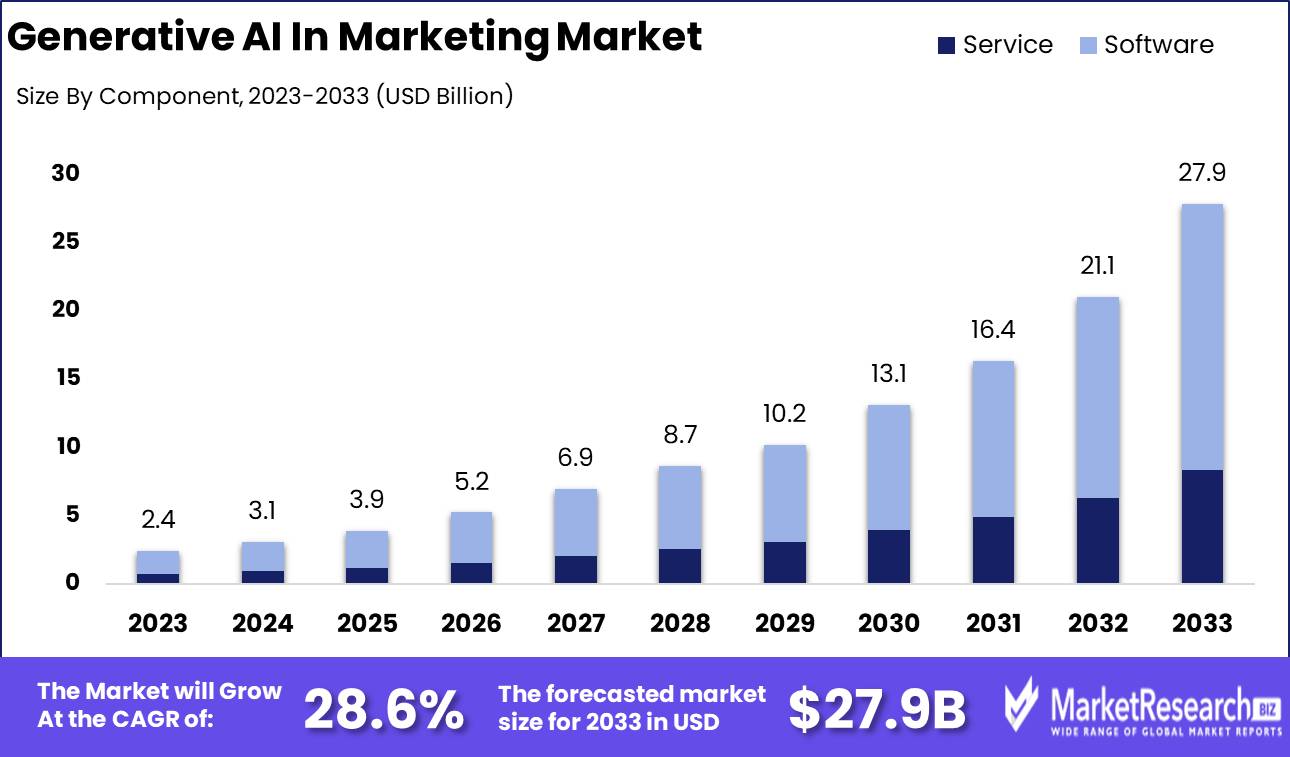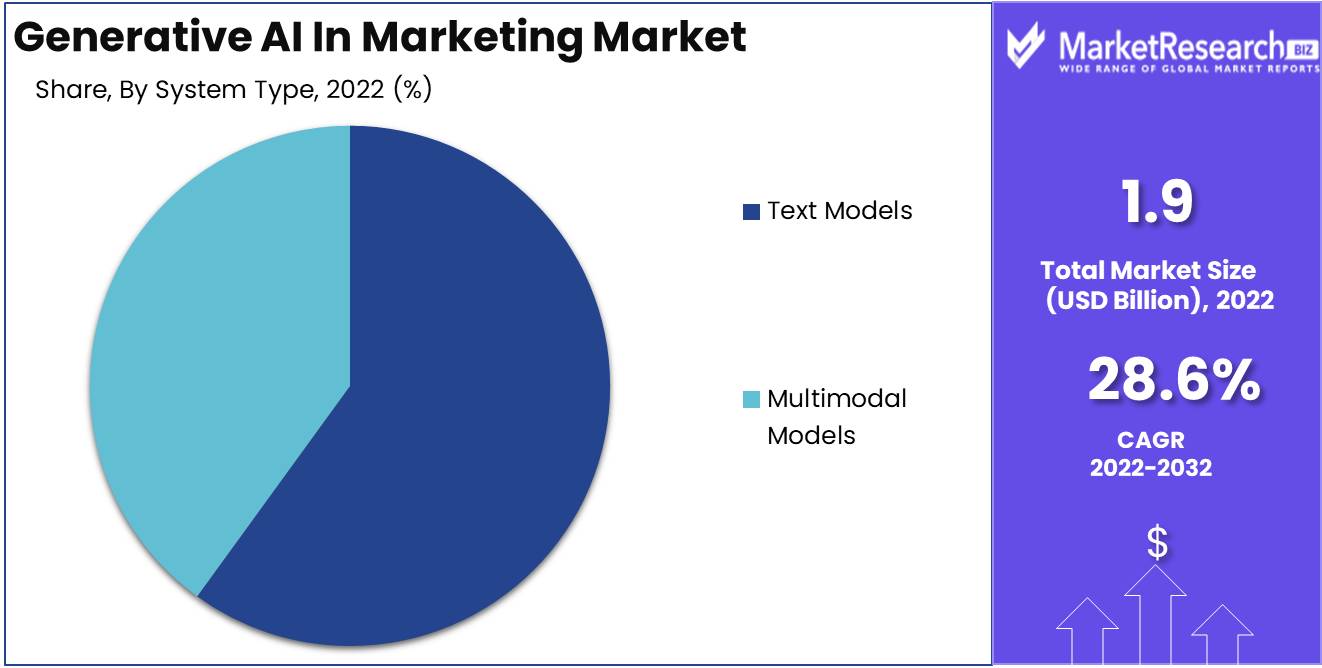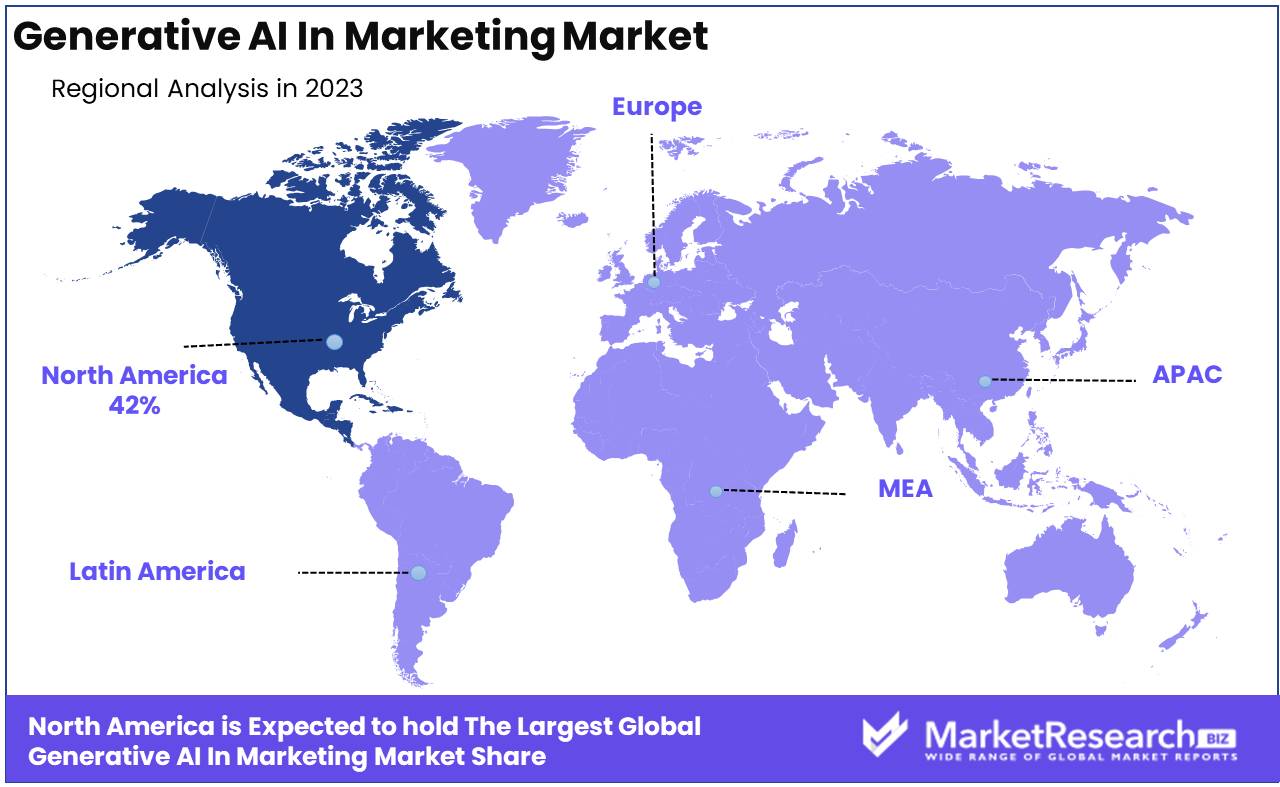
Generative AI In Marketing Market By Component (Service, Software), By System Type (Text Models, Multimodal Models, Stable Diffusion, Progen), By Application (Text Generation, Image Generation, Video Generation, Music Generation, Search Engine Optimization (SEO), Other Application), By End-User Industry (Media & Entertainment, IT & Telecommunications, Healthcare, Automotive & Transportation, BFSI, Other End-Use Industries), By Region and Companies - Industry Segment Outlook, Market Assessment, Competition Scenario, Trends and Forecast 2024-2033
-
38933
-
Aug 2024
-
137
-
-
This report was compiled by Vishwa Gaul Vishwa is an experienced market research and consulting professional with over 8 years of expertise in the ICT industry, contributing to over 700 reports across telecommunications, software, hardware, and digital solutions. Correspondence Team Lead- ICT Linkedin | Detailed Market research Methodology Our methodology involves a mix of primary research, including interviews with leading mental health experts, and secondary research from reputable medical journals and databases. View Detailed Methodology Page
-
Quick Navigation
Report Overview
The Global Generative AI In Marketing Market was valued at USD 2.4 Bn in 2023. It is expected to reach USD 27.9 Bn by 2033, with a CAGR of 28.6% during the forecast period from 2024 to 2033.
The Generative AI in Marketing Market involves the application of artificial intelligence technologies to create content, strategies, and solutions that enhance marketing efforts. This includes AI-generated visuals, personalized email campaigns, and automated customer interactions. Growth in this market is driven by the increasing demand for data-driven marketing, advancements in AI capabilities, and the proven effectiveness of AI-generated content in improving engagement and conversion rates. Key players are leveraging generative AI to deliver innovative and scalable marketing solutions that drive brand growth and customer engagement.
 The Generative AI in Marketing Market is rapidly evolving, offering transformative potential for businesses seeking to enhance their marketing strategies through automation and personalization. By leveraging generative AI technologies, companies can create highly engaging and customized content that resonates with their target audiences. Notably, businesses utilizing AI-generated visuals, such as those created by DALL-E, have reported a 25% increase in social media engagement. This highlights the capability of generative AI to produce visually appealing and relevant content that captures audience attention more effectively than traditional methods.
The Generative AI in Marketing Market is rapidly evolving, offering transformative potential for businesses seeking to enhance their marketing strategies through automation and personalization. By leveraging generative AI technologies, companies can create highly engaging and customized content that resonates with their target audiences. Notably, businesses utilizing AI-generated visuals, such as those created by DALL-E, have reported a 25% increase in social media engagement. This highlights the capability of generative AI to produce visually appealing and relevant content that captures audience attention more effectively than traditional methods.In the realm of email marketing, generative AI is delivering unprecedented results. Persado's AI-generated emails, for instance, have achieved click-through rates six times higher than those crafted by human marketers. This significant improvement underscores the ability of AI to analyze vast datasets and generate highly optimized and persuasive email content tailored to individual recipient preferences. As a result, businesses can drive higher engagement and conversion rates, ultimately leading to increased revenue and customer loyalty.
The market's growth is further fueled by continuous advancements in AI algorithms and machine learning models, enabling more sophisticated and accurate content generation. Companies are increasingly investing in AI-driven marketing solutions to stay competitive and meet the rising expectations of consumers for personalized and timely interactions. Key players are focusing on integrating generative AI into their marketing platforms to offer comprehensive solutions that streamline content creation, enhance customer experiences, and optimize marketing performance.
Key Takeaways
- Market Value: The Global Generative AI In Marketing Market was valued at USD 2.4 Bn in 2023. It is expected to reach USD 27.9 Bn by 2033, with a CAGR of 28.6% during the forecast period from 2024 to 2033.
- By Component: Software leads with 70%, providing essential tools for implementing AI-driven marketing strategies.
- By System Type: Text Models constitute 35%, crucial for generating personalized marketing content.
- By Application: Text Generation makes up 55%, enhancing the efficiency and creativity of marketing campaigns.
- By End-User Industry: Media & Entertainment utilizes 30%, leveraging AI for targeted and dynamic marketing efforts.
- Regional Dominance: North America holds a 42% market share, driven by high adoption rates and advanced digital marketing infrastructure.
- Growth Opportunity: Enhancing AI algorithms for more accurate customer segmentation and personalization can significantly boost marketing campaign effectiveness.
Driving factors
Growing Need for Personalized Marketing Strategies
The growing need for personalized marketing strategies is a significant driver of the generative AI in marketing market. In an era where consumers expect tailored experiences, businesses are increasingly turning to generative AI to create personalized marketing content. This technology enables marketers to analyze vast amounts of data and generate customized messages that resonate with individual consumers, enhancing engagement and conversion rates.
Personalized marketing strategies, powered by generative AI, help brands to stand out in a competitive landscape, fostering customer loyalty and driving sales. As personalization becomes a standard expectation, the demand for generative AI tools that can deliver bespoke marketing content is set to rise, propelling market growth.
Advancements in AI and Data Analytics
Advancements in AI and data analytics are crucial in driving the growth of the generative AI in marketing market. Continuous machine learning development algorithms and data processing capabilities enable generative AI to produce more accurate and sophisticated marketing content. Enhanced data analytics allows businesses to gain deeper insights into consumer behavior, preferences, and trends, which can be used to refine marketing strategies and improve targeting.
These technological advancements not only increase the effectiveness of generative AI tools but also make them more accessible and affordable for a broader range of businesses. As AI and data analytics technologies evolve, they expand the potential applications of generative AI in marketing, fueling market expansion.
Increasing Demand for Efficient Content Creation
The increasing demand for efficient content creation is another key factor contributing to the growth of the generative AI in marketing market. Marketers are under constant pressure to produce high-quality content rapidly to keep up with the fast-paced digital landscape. Generative AI offers a solution by automating the content creation process, generating text, images, and videos quickly and at scale.
This efficiency not only reduces the time and cost associated with content production but also ensures consistency and accuracy across various marketing channels. As businesses strive to maintain a steady flow of engaging content, the adoption of generative AI tools for efficient content creation is expected to surge, driving market growth.
Restraining Factors
Concerns Over Data Privacy and Security
Concerns over data privacy and security present significant challenges to the generative AI in marketing market. As generative AI relies heavily on large datasets to create personalized marketing content, the handling of consumer data becomes a critical issue. Consumers and regulatory bodies are increasingly vigilant about data privacy, leading to stringent regulations such as GDPR and CCPA.
These regulations impose strict guidelines on data collection, storage, and usage, making it challenging for businesses to leverage generative AI without risking compliance breaches. The fear of data breaches and misuse can deter companies from adopting generative AI solutions, thereby restraining market growth. Ensuring robust data privacy and security measures is essential to alleviate these concerns and foster broader acceptance of generative AI in marketing.
High Implementation Costs
High implementation costs are another significant restraining factor for the generative AI in marketing market. Developing and integrating advanced generative AI systems require substantial investment in technology, infrastructure, and skilled personnel. Smaller businesses or those with limited budgets may find it financially prohibitive to adopt these sophisticated tools, limiting the market’s accessibility.
The ongoing costs associated with maintaining and updating AI systems can further strain financial resources. This economic barrier can slow down the adoption rate of generative AI technologies, particularly among startups and small to medium-sized enterprises (SMEs). To overcome this restraint, the market needs more cost-effective solutions and scalable AI models that can cater to a wider range of businesses.
By Component Analysis
Software held a dominant market position in the By Component segment of the Generative AI in Marketing Market, capturing more than a 70% share.
In 2023, Software held a dominant market position in the By Component segment of the Generative AI in Marketing Market, capturing more than a 70% share. The significant lead of software is attributed to its critical role in creating, deploying, and managing generative AI models. These software solutions enable marketers to automate content creation, personalize marketing campaigns, and enhance customer engagement through AI-generated insights. The widespread adoption of AI-powered marketing tools and platforms drives the demand for generative AI software, making it the dominant component in this market.
Services associated with generative AI, such as consulting, integration, and support, are also essential. However, their market share is smaller compared to software due to the reliance on robust and scalable software solutions to implement and manage generative AI applications effectively. As businesses continue to integrate AI into their marketing strategies, the demand for services to support these implementations is expected to grow, complementing the dominant software segment.
By System Type Analysis
Text Models held a dominant market position in the By System Type segment of the Generative AI in Marketing Market, capturing more than a 35% share.
In 2023, Text Models held a dominant market position in the By System Type segment of the Generative AI in Marketing Market, capturing more than a 35% share. Text models, such as GPT-3 and other advanced language models, are extensively used for content creation, customer interactions, and personalized messaging. Their ability to generate coherent and contextually relevant text makes them invaluable for marketing applications, driving their significant market share.
Multimodal Models, which combine text, Multimodal imaging, and video generation capabilities, are gaining traction. These models enhance marketing strategies by creating more engaging and interactive content, though they currently hold a smaller share compared to text models.
Stable Diffusion and Progen represent other innovative system types in generative AI, each with unique applications and benefits. While they contribute to the market, their adoption is less widespread compared to text models due to their specialized use cases.
By Application Analysis
Text Generation held a dominant market position in the By Application segment of the Generative AI in Marketing Market, capturing more than a 55% share.
In 2023, Text Generation held a dominant market position in the By Application segment of the Generative AI in Marketing Market, capturing more than a 55% share. Text generation is extensively used in marketing for creating personalized email campaigns, social media posts, product descriptions, and other forms of written content. The ability of generative AI to produce large volumes of high-quality text quickly and efficiently makes it a preferred application in the marketing sector.
Image Generation and Video Generation are also crucial applications, enabling marketers to create visually appealing content that enhances engagement and drives conversions. These applications are growing in importance but currently hold smaller shares compared to text generation due to their higher complexity and resource requirements.
Music Generation and Search Engine Optimization (SEO) represent other applications of generative AI in marketing. Music generation is used for creating background scores and jingles, while AI-driven SEO tools help optimize content for better search engine rankings. Both applications contribute to the market but have niche uses compared to the more broadly applicable text generation.

By End-User Industry Analysis
Media & Entertainment held a dominant market position in the By End-User Industry segment of the Generative AI in Marketing Market, capturing more than a 30% share.
In 2023, Media & Entertainment held a dominant market position in the By End-User Industry segment of the Generative AI in Marketing Market, capturing more than a 30% share. The media and entertainment industry extensively uses generative AI for content creation, audience engagement, and personalized marketing campaigns. The ability to generate diverse and high-quality content quickly makes AI an invaluable tool in this sector, driving its significant market share.
IT & Telecommunications utilize generative AI to enhance customer interactions, optimize marketing strategies, and create targeted campaigns. Although significant, their market share is smaller compared to media and entertainment due to the broader scope of applications in the latter.
Healthcare adopts generative AI for patient engagement, personalized communication, and educational content, contributing to improved pediatric healthcare marketing efforts. The market share in this sector is growing as AI applications in healthcare marketing become more sophisticated.
Automotive & Transportation industries leverage generative AI for personalized marketing, customer relationship management, and enhancing the overall customer experience. Despite their increasing adoption, their market share remains smaller compared to media and entertainment.
BFSI (Banking, Financial Services, and Insurance) uses generative AI for fraud detection, customer engagement, and personalized financial advice, contributing to market growth. However, the highly regulated nature of the industry limits the broader application of generative AI in marketing.
Other End-Use Industries, including retail, education, and manufacturing, also benefit from generative AI in marketing. These industries utilize AI to enhance their marketing strategies and improve customer engagement, collectively contributing to the market's overall growth.
Key Market Segments
By Component
- Service
- Software
By System Type
- Text Models
- GPT-3
- LaMDA
- LLaMA
- Multimodal Models
- GPT-4
- DALL-E
- Stable Diffusion
- Progen
By Application
- Text Generation
- Image Generation
- Video Generation
- Music Generation
- Search Engine Optimization (SEO)
- Other Application
By End-User Industry
- Media & Entertainment
- IT & Telecommunications
- Healthcare
- Automotive & Transportation
- BFSI
- Other End-Use Industries
Growth Opportunity
Development of AI-Driven Marketing Automation Tools
The development of AI-driven marketing automation tools presents a significant growth opportunity for the generative AI in marketing market in 2024. These tools can automate various aspects of marketing, from content creation to customer engagement and campaign management. By leveraging AI, businesses can streamline their marketing processes, reduce manual workloads, and achieve greater precision in targeting and personalization.
Automation tools equipped with generative AI capabilities can create high-quality content at scale, adapt marketing messages in real-time, and optimize campaign performance based on data-driven insights. This increased efficiency not only boosts productivity but also enhances the overall effectiveness of marketing strategies, driving market growth.
Expansion in Predictive Analytics for Customer Behavior
The expansion in predictive analytics for customer behavior offers another promising opportunity for the generative AI in marketing market. Predictive analytics powered by AI can analyze historical data to forecast future customer actions and preferences, enabling businesses to anticipate trends and tailor their marketing efforts accordingly. This capability allows for more effective targeting, personalized marketing campaigns, and improved customer retention.
By integrating generative AI with predictive analytics, marketers can generate content that resonates with specific audience segments and adjust their strategies proactively. This fusion of technologies not only enhances the accuracy of marketing predictions but also drives innovation in customer engagement and experience, propelling market growth.
Latest Trends
Use of Generative AI for Dynamic and Personalized Ads
One of the key trends shaping the generative AI in marketing market in 2024 is the use of AI for dynamic and personalized advertisements. Generative AI enables the creation of highly customized ads tailored to individual consumer preferences and behaviors. By analyzing vast amounts of data, AI can generate content that resonates with specific audiences, ensuring higher engagement and conversion rates.
Dynamic ads, which adjust content in real-time based on user interactions and contextual factors, enhance the relevance and impact of marketing campaigns. This trend is revolutionizing advertising strategies by providing brands with the tools to deliver more effective, personalized marketing messages, driving customer satisfaction and loyalty.
Integration with CRM Systems for Targeted Marketing
The integration of generative AI with Customer Relationship Management (CRM) systems is another significant trend in 2024. By combining AI capabilities with CRM data, businesses can achieve more precise targeting and personalization in their marketing efforts. Generative AI can analyze CRM data to identify patterns, predict customer needs, and generate personalized content that aligns with individual customer journeys.
This integration enables marketers to deliver targeted campaigns that are more likely to resonate with customers, thereby improving engagement and conversion rates. It allows for the automation of marketing tasks, freeing up resources and enhancing operational efficiency. The synergy between generative AI and CRM systems is driving more effective and targeted marketing strategies, contributing to market growth.
Regional Analysis
North America held a dominant market position in the Generative AI in Marketing Market, capturing more than a 42% share.
The North America region dominated the Generative AI in Marketing Market in 2023, capturing more than a 42% share. This dominance is driven by the advanced technological infrastructure, high adoption rates of AI in marketing strategies, and significant investments in AI-driven marketing solutions. The U.S., in particular, is a major contributor, with numerous tech companies and startups developing innovative AI marketing tools. The increasing demand for personalized marketing and the need to enhance customer engagement further drive market growth in North America.
Europe follows closely, with a strong focus on data-driven marketing and AI innovation. Countries like Germany, the UK, and France are investing heavily in AI technologies to enhance their marketing capabilities. The market growth in Europe is supported by government initiatives and public-private partnerships aimed at fostering AI innovation in marketing.
The Asia Pacific region is experiencing rapid growth in the generative AI in marketing market, driven by significant investments in AI research and development. Countries like China, Japan, and India are leading the adoption of AI-driven marketing technologies. The rising number of AI startups and the increasing integration of AI in marketing strategies contribute to market growth in the region.
In the Middle East & Africa, the generative AI in marketing market is emerging, with growing interest in AI-driven marketing solutions. Countries in the Middle East, such as the UAE and Saudi Arabia, are making significant investments in AI to drive economic growth and innovation.
Latin America is steadily adopting generative AI in marketing, with countries like Brazil and Mexico leading the market. The increasing digitalization and the growing demand for AI-driven marketing solutions across various industries are driving market growth in the region.

Key Regions and Countries
North America
- US
- Canada
- Mexico
Western Europe
- Germany
- France
- The UK
- Spain
- Italy
- Portugal
- Ireland
- Austria
- Switzerland
- Benelux
- Nordic
- Rest of Western Europe
Eastern Europe
- Russia
- Poland
- The Czech Republic
- Greece
- Rest of Eastern Europe
APAC
- China
- Japan
- South Korea
- India
- Australia & New Zealand
- Indonesia
- Malaysia
- Philippines
- Singapore
- Thailand
- Vietnam
- Rest of APAC
Latin America
- Brazil
- Colombia
- Chile
- Argentina
- Costa Rica
- Rest of Latin America
Middle East & Africa
- Algeria
- Egypt
- Israel
- Kuwait
- Nigeria
- Saudi Arabia
- South Africa
- Turkey
- United Arab Emirates
- Rest of MEA
Key Players Analysis
Microsoft leverages its AI capabilities and cloud infrastructure to offer advanced generative AI solutions in marketing. Its integration of AI in products like Microsoft Dynamics 365 enhances marketing automation and personalization.
IBM's Watson AI platform provides robust generative AI solutions for marketing, enabling predictive analytics and customer engagement strategies. Its comprehensive AI services position IBM as a market leader.
Google’s AI-driven marketing tools, such as Google Ads and Google Analytics, utilize generative AI to optimize ad campaigns and deliver personalized customer experiences. Its extensive AI expertise drives significant market impact.
AWS offers scalable AI solutions for marketing through its cloud platform. Its comprehensive suite of AI tools facilitates data-driven marketing strategies and enhances customer targeting.
Adobe’s AI-powered marketing solutions, including Adobe Sensei, enable advanced content creation and customer insights. Its focus on creative and data-driven marketing positions Adobe as a key player in the market.
Companies like Air Products & Chemicals, Inc., Synthesis AI, Genie AI Ltd., MOSTLY AI Inc., and Open AI contribute to the generative AI in marketing market. Their innovative solutions and continuous advancements drive the market's growth and transformation.
Market Key Players
- Microsoft Corporation Company Profile
- IBM Corporation
- Google LLC
- Amazon Web Services. Inc.
- Adobe Inc.
- Air Products & Chemicals, Inc. Company Profile
- Synthesis AI
- Genie AI Ltd.
- MOSTLY AI Inc.
- Open AI
- Other Key Players
Recent Development
- In June 2024, OpenAI partnered with a major marketing firm to develop AI-driven solutions for market analysis and campaign optimization. This partnership aims to enhance the effectiveness of marketing strategies.
- In February 2024, IBM Corporation launched an AI-powered marketing platform that uses generative AI to create personalized advertising campaigns. This platform aims to improve customer engagement by 30%.
Report Scope
Report Features Description Market Value (2023) USD 2.4 Bn Forecast Revenue (2033) USD 27.9 Bn CAGR (2024-2033) 28.6% Base Year for Estimation 2023 Historic Period 2018-2023 Forecast Period 2024-2033 Report Coverage Revenue Forecast, Market Dynamics, Competitive Landscape, Recent Developments Segments Covered By Component (Service, Software), By System Type (Text Models, Multimodal Models, Stable Diffusion, Progen), By Application (Text Generation, Image Generation, Video Generation, Music Generation, Search Engine Optimization (SEO), Other Application), By End-User Industry (Media & Entertainment, IT & Telecommunications, Healthcare, Automotive & Transportation, BFSI, Other End-Use Industries) Regional Analysis North America - The US, Canada, & Mexico; Western Europe - Germany, France, The UK, Spain, Italy, Portugal, Ireland, Austria, Switzerland, Benelux, Nordic, & Rest of Western Europe; Eastern Europe - Russia, Poland, The Czech Republic, Greece, & Rest of Eastern Europe; APAC - China, Japan, South Korea, India, Australia & New Zealand, Indonesia, Malaysia, Philippines, Singapore, Thailand, Vietnam, & Rest of APAC; Latin America - Brazil, Colombia, Chile, Argentina, Costa Rica, & Rest of Latin America; Middle East & Africa - Algeria, Egypt, Israel, Kuwait, Nigeria, Saudi Arabia, South Africa, Turkey, United Arab Emirates, & Rest of MEA Competitive Landscape Microsoft Corporation Company Profile, IBM Corporation, Google LLC, Amazon Web Services. Inc., Adobe Inc., Air Products & Chemicals, Inc. Company Profile, Synthesis AI, Genie AI Ltd., MOSTLY AI Inc., Open AI, Other Key Players Customization Scope Customization for segments, region/country-level will be provided. Moreover, additional customization can be done based on the requirements. Purchase Options We have three licenses to opt for: Single User License, Multi-User License (Up to 5 Users), Corporate Use License (Unlimited User and Printable PDF) -
-
- Microsoft Corporation Company Profile
- IBM Corporation
- Google LLC
- Amazon Web Services. Inc.
- Adobe Inc.
- Air Products & Chemicals, Inc. Company Profile
- Synthesis AI
- Genie AI Ltd.
- MOSTLY AI Inc.
- Open AI
- Other Key Players




